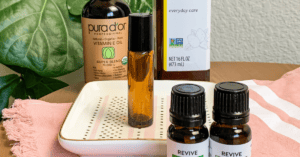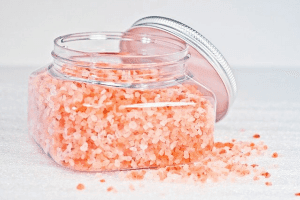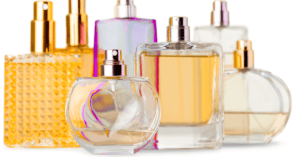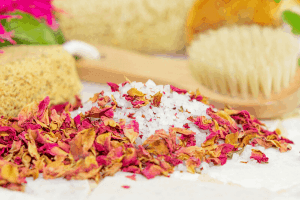Is Silicone Bad for Skin? 10 Reasons Why You Should Avoid It
Silicone is one ingredient you may want to steer clear of as you transition to a clean beauty routine, especially if you have sensitive or acne-prone skin. But what products have it?
Are you wondering if silicone is bad for your skin? When you are switching to clean beauty, it can feel overwhelming; wondering what you need to throw out and what is okay to keep.
And it doesn’t help that the jury seems to be out on this one! Some say it’s totally okay to use beauty products with silicone in it, and others say you should not use silicone in your skin care routine.
How do you know what to believe?
While silicone has been deemed ‘safe’ by experts, I believe you should avoid skincare products with silicone. I’ll explain why below.
This post contains affiliate links. You can learn more here.
Pin this image for later!
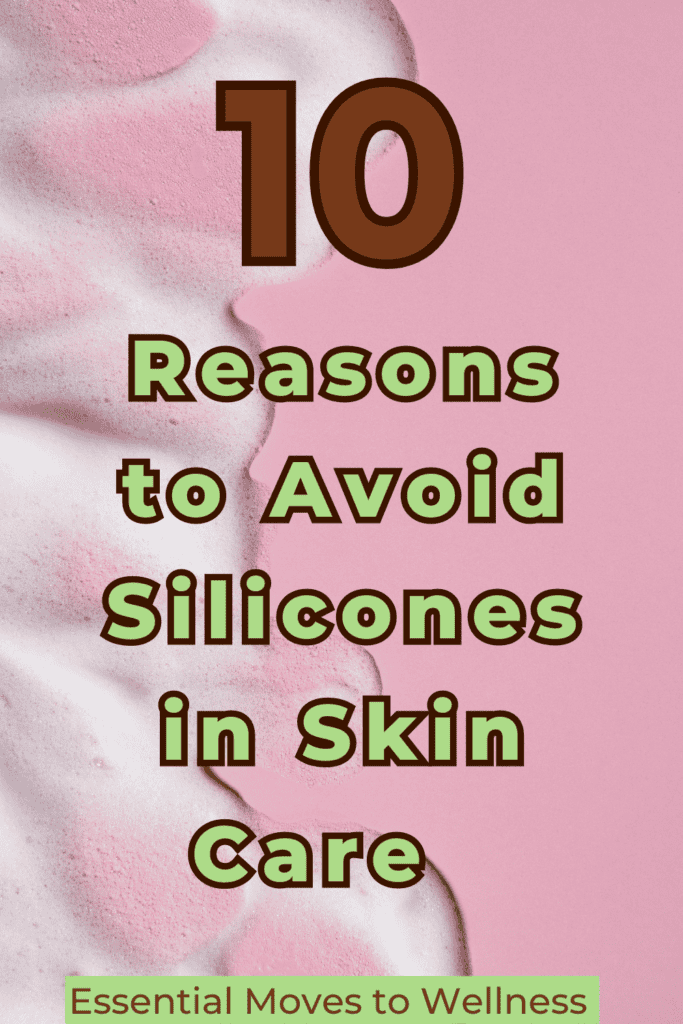
What is Silicone?
Silicone is a synthetic ingredient made from silicon. Silicon is an element, usually combined with another element, such as oxygen. Silicon and oxygen atoms together create silica, which is a common component of sand.
Silicone, however, is an inorganic synthetic polymer made from silicon and other elements, such as oxygen, carbon, or hydrogen atoms. These atoms undergo a complex chemical process, to become silicone.
If you almost failed chemistry like me and don’t quite understand how this stuff works, that’s okay. The gist is silicone is not a natural ingredient nor made through a natural process, as some may believe.
The first thing you need to know is that silicone isn’t usually listed on a product’s ingredient list. You need to look for ingredients ending with “ane”, “one”, “zane”, “xane”, “cone”, “col”, or “cono”.
The most common silicone derivatives listed on labels are:
- Cyclopentasiloxane
- Cyclohexasiloxane
- Dimethicone
- Cetearyl methicone
Is Silicone Safe for Skin?
Most experts say silicone is safe for your skin, because they have no reason to believe that it’s not safe.
A study in the American College of Toxicology found silicone to be nontoxic. And because it does not absorb into your skin, they have no safety concerns.
But they also admit that they do not have data on the reproductive and developmental toxicity, or on carcinogenicity. In other words, we just don’t know enough to label silicones “toxic” or “non-toxic.”
One thing to consider is just because it doesn’t absorb into your skin, doesn’t mean it’s good for you or won’t cause any adverse reactions. I’ll explain why below.
Why Should You Avoid Silicone?
Although there is no reason to believe that silicone is toxic, at this point, anyway, there are a few reasons why you may want to avoid silicones, regardless.
Silicone-based Products Can Clog Pores
Silicone isn’t absorbed into your skin, but it does form a breathable barrier on top of your skin. Silicone supporters like this barrier, because they claim it traps moisture in, hydrating your skin.
But it can also trap dirt, debris, and other impurities against your skin. These things can clog your pores, encouraging acne and blackheads to form.
And just as moisture is trapped in your skin, sweat can also be trapped against your skin, causing clogged pores. If you’re prone to acne, this is reason enough to avoid silicones in skin care.
I remember before I switched to clean beauty, if I applied a moisturizer and immediately went into a hot environment and started to sweat, I could feel the sweat pooling underneath the lotion and sweltering around. Not good. Also, gross.
Silicone Slows Down Cell Growth
That silicone barrier also traps dead skin cells on your skin’s surface. The dead skin cells then build up, causing dry, dull skin. They too, can clog your pores, and cause breakouts.
This buildup of old skin cells makes it harder for your skin to create new skin cells as well, contributing to dull-looking skin. If you’re trying to reverse this, I highly recommend you check out vitamin C serum benefits!
Silicone Dehydrates Your Skin
The silicone barrier blocks moisture from absorbing into your skin. And since no moisture can get in, it dries your skin out. This dehydrates your skin, which in turn causes it to look dull and lifeless.
Silicone Can Cause Acne
Those against using silicone often cite that it causes acne. And while it can cause acne, silicone itself does not.
Silicone is non-comedogenic, which means it is deliberately designed to not clog pores. So, it shouldn’t cause acne.
But it fails pretty badly at it. Simply because the silicone barrier on the skin traps in all those impurities. So, while the silicone doesn’t necessarily clog your pores, all the junk trapped against your skin surface does.
Improper cleaning and improper usage can also cause acne. Most dermatologists will recommend you avoid silicone products if you have skin concerns or acne prone skin.
Silicone Blocks the Absorption of Healthy Skincare Ingredients
Silicone forms a barrier that keeps other good ingredients out.
If you use a product with silicone in it, and then use a product with natural ingredients, such as cocoa butter, jojoba oil, or Vitamin E, they won’t be able to penetrate your skin. The silicone makes them literally worthless.
This is also a perfect reason why layering your skin care in a specific order is key for glowing skin! Check out my skin care guide to learn more.
Silicone Does not Support Skin Health
There is nothing good about silicone. I mean, it might be able to heal wounds, and silicone adhesives are used for scar reduction, but other than that, it offers no skin benefits. It does not have anti-oxidant properties, anti-aging properties, and it is not nourishing or hydrating.
And while the silicone barrier on your skin can trap in moisture and fill in fine lines and wrinkles, it doesn’t actually change or improve your skin in any way.
When you completely wash it off, your skin will look the same as it did before you applied it. I’m sure you’d want something that does much more for your skin!
Silicone is Difficult to Remove
Speaking of washing it off, silicone is actually waterproof. And sweat-proof.
To fully remove it, you often have to use harsh skincare products, which can, in turn, dry out your skin. And if you’re here reading this article, I’m sure you’d rather not have to do something like that!
And if you don’t fully remove it, the silicone residue continues to coat the skin, just piling up there. This can irritate your skin, or trap in dirt and impurities, which can lead to acne.
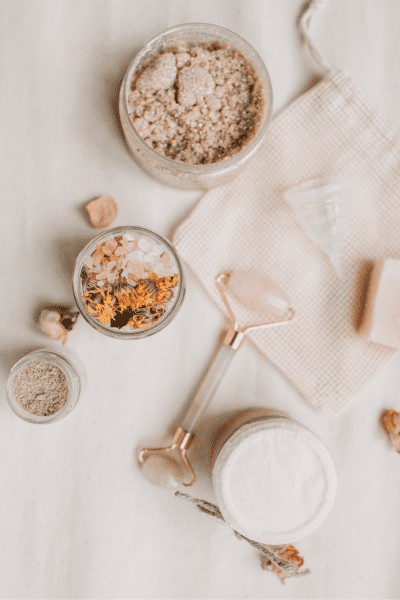
Silicone is Bad for the Environment
Silicone is just like plastic or rubber – it is not biodegradable or recyclable. It takes a long time to decompose. If you’re passionate about sustainability, it’s a hard no.
Silicone Can Accelerate Aging
Silicone skincare products can damage and dry out your skin, which accelerates the aging process. Fine lines and wrinkles form on dehydrated skin and are often more visible since your skin loses its elasticity and plumpness.
On top of that, silicone has no anti-aging properties, like so many other natural ingredients. If you want to get some anti-aging benefits with plump skin, you need to check out this serum by Osea!
Silicone is a Chemical
And finally, let’s not forget that silicone is not natural. It is derived from natural ingredients, but it is heavily processed.
Like all synthetic ingredients, people with sensitive skin can have allergic reactions to silicone.
Reactions could include:
- Irritation
- Dryness
- Inflammation
- Swelling
- Burning
- Itching
- Redness
If you have sensitive skin, you should definitely avoid products with silicone in them.
Why is Silicone Used in Skin Care Products?
With all of these reasons to avoid silicone, you may be wondering why they use it in skin and hair care products at all! (I contemplate this about most everything in beauty products daily)
It’s all about presentation. Silicone gives cosmetic products that soft, slippery feel.
Silicone makeup primers and other cream based cosmetics offer instant gratification, as well, which is great for marketing purposes. It makes your skin feel softer and smoother, if only for a moment.
Companies can sell this to consumers, making them believe the silicone is actually benefiting their skin, when in fact, it’s all an illusion.
Before You Go!
Experts have declared silicone safe for skin. But they do not have any data on the developmental or reproductive toxicity of silicone, or on its carcinogenicity. So, it’s a use at your own risk kind of thing.
Plus, silicone doesn’t actually provide any health benefits. It only makes your skin appear to be healthy, when in fact, it’s preventing it from getting the nourishment it needs. So, it’s kind of an illusion.
With so many conflicting opinions, even amongst experts, figuring out which ingredients to use and which ingredients to avoid can be confusing!
But if you’re ready for a clean skin care routine, I’m here to help you find what works – for you. It all starts with educating yourself on ingredient lists and understanding the ins and outs of the cosmetics industry.
And my ebook, Essential Moves to Clean Beauty can teach you everything you need to know! Grab a copy to easily transition to clean beauty products without being completely overhelmed!
Related to Silicone and Skin Care:
- How to Start Your Clean Beauty Transition Without Losing Your Mind
- A Quick Guide to Starting a Natural Skin Care Routine for Beginners
- Think Dirty App Review | Your Ingredient List Secret Weapon!
- EWG Healthy Living App Review | Does It Really Work?
- 5 Things No One Will Tell You About the Clean Beauty Movement (What to Expect)

